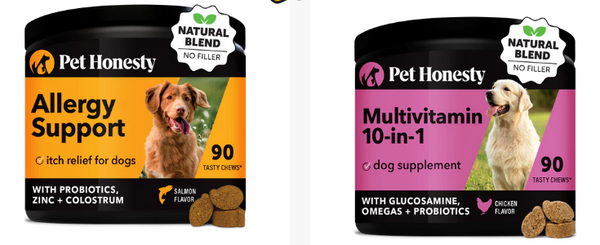As dog owners, we understand the essential role that our furry best friends play in our lives. Dogs brighten our mornings with their wagging tails and spark for life, eagerly awaiting each new move throughout the day. Just as we value a solid morning routine for ourselves, it’s important to consider the habits that shape our dogs' days, too.
In this extensive guide, we delve into why establishing a dog-friendly morning routine complete with probiotics and multivitamins can lead to a happier, healthier life for your pet and, consequently, a stress-free environment for you.
Benefits of Probiotics and Multivitamins for Dogs
Before we jump into the ultimate dog morning routine, let's first understand why probiotics and multivitamins are beneficial for our canine friends' morning routines:
Gastrointestinal Health
Introducing probiotics into your dog's daily routine can help in managing various gastrointestinal issues such as diarrhea and irritable bowel syndrome, and it even helps ease the effects of antibiotics. Whether your dog is a young puppy or a full-grown adult dog, probiotics and other multivitamins can set your dog's day up for success.
Allergy Management
Some studies suggest that a healthy gut can reduce allergic reactions. Since most dogs commonly suffer from allergies, probiotics and multivitamins can provide some much-needed relief.
Improved Skin and Coat Health
Stable gut health means less inflammation, which can reflect in your dog's coat, keeping it soft and shiny. This is especially important for certain breeds prone to skin conditions and health conditions that affect their coat.
Boosting the Immune System
Multi-vitamins ensure your dog’s immune system is up and ready to tackle daily threats. They are especially beneficial for elderly dogs and puppies.
Vitality
With an appropriate dosage of vitamins, you will notice your dog having more energy and being more alert. This can be crucial, particularly in high-energy or working breeds.
Aiding Growth and Development
For puppy parents, multivitamins play an essential role in the growth of a healthy and robust canine. They support bone health and muscle function during the critical stages of development.
Reduces Separation Anxiety and Stress
Probiotics and multivitamins have also been shown to reduce stress levels in dogs, making them a useful tool for tackling separation anxiety or other forms of stress.
Essential Multivitamins
Just like humans, dogs can benefit from multivitamins to supplement their diet. These essential vitamins and minerals help in maintaining a robust immune system, strong bones and teeth, and overall health and well-being.
Vitamin A
Vitamin A is crucial for healthy skin, vision, and coat. It also plays a role in immune function.
Vitamin D
Vitamin D is essential for the absorption of calcium and phosphorous, which are vital for maintaining strong bones and teeth. Vitamin D can, however, cause serious health problems at extremely high levels.
Vitamin C
Vitamin C is a powerful antioxidant that can help boost your dog's immune system and protect against illness and disease.
B Vitamins
B vitamins, including B1, B2, B6, and B12, are essential for energy production and nervous system function. They also aid in digestion and promote a healthy coat.
Calcium
Calcium is essential for strong bones and teeth, as well as muscle function. It also plays a vital role in blood clotting and nerve function.
Iron
Iron is crucial for the production of red blood cells, which carry oxygen throughout the body. It also aids in energy production and immune system function. Iron is especially important for dogs that suffer from anemia.
Omega-3 Fatty Acids
Omega-3 fatty acids provide numerous health benefits for dogs, including promoting healthy skin and coat, reducing inflammation, and supporting brain function.

Choosing the Right Probiotics and Multivitamins for Dogs
As the market is flooded with various supplements, choosing the right one can be daunting for many dog owners. Look for products that are tailored to your dog's size, age, and breed. Always aim for natural, organic supplements with minimal fillers.
At Pet Honesty, we offer a range of probiotics and multivitamins designed to target specific areas such as coat health or allergies. Our collection includes various supplements that can be tailored to a dog's daily schedule and unique needs, further enhancing the effects of a consistent morning routine.
Designing a Morning Routine for Dogs
Creating a healthy bed and morning routine for your dog is much like doing it for yourself—organization is key. Be consistent, incorporate different healthy habits, and ensure the routine starts at the same time each day.
Feeding
Ensure the first part of your dog's morning routine is to eat a protein-rich breakfast that fits their dietary needs. This is an excellent time to incorporate probiotics and multivitamins, too.
Exercise
A vital part of any daily dog routine is a brisk morning walk at the local dog park. Aside from a much-awaited potty break, this is crucial for training, as physical activity is as vital for dogs as it is for humans, fostering a healthy body and mental stimulation.
If your schedule doesn't allow for this, consider hiring a dog walker. This is especially important for large breed dogs!
Grooming
Spending a few minutes grooming can bond you with your dog and help you observe any potential health issues. A daily brushing and teeth cleaning should be a part of the morning routine.
Common Challenges and Solutions
While building a morning routine for your dog may seem like a walk in the park, there are common obstacles to overcome. For instance, many dogs can be picky eaters, and getting them to take supplements can be tough.

Picky Eaters
Try mixing the supplement with your dog's food or choose a treat from the same brand that's equally beneficial. Over time, your dog will get used to the new taste and might even look forward to it.
Time Constraints
If time is a problem, multitask. Give your dog its supplements while you're preparing food, then combine the next activities —like feeding, a walk, and grooming— so that your dog’s routine becomes an integrated part of yours.
FAQs
How often should I give my dog supplements?
The frequency of giving your dog supplements depends on the specific product and dosage instructions. Generally, probiotics can be given daily, while multivitamins may have more specific dosages.
Can I give my dog human multivitamins?
No, you should not give your dog human multivitamins. Dogs have different nutritional needs than humans, and too much of certain vitamins can be harmful to dogs. Stick to supplements specifically formulated for dogs.
Are there any side effects of giving my dog supplements?
Supplements generally do not cause any significant side effects in dogs. However, if you notice any adverse reactions or changes in behavior after starting your dog on a new supplement, it's best to consult with your veterinarian.
Are there any supplements that are not safe for dogs?
Yes, certain supplements should be avoided for dogs, such as those containing xylitol or caffeine. Always check the ingredients list before giving your dog any supplements.
Can I give my puppy supplements?
Yes, puppies can benefit from certain supplements, such as multivitamins and probiotics. However, it's essential to consult with a veterinarian before giving any supplement to ensure it is safe and appropriate for your puppy's age and breed.
What should I do if my dog refuses to take the supplement?
If your dog refuses to take a supplement, try hiding it in their food or water bowl or using a treat from the same brand. You can also consult with a veterinarian for alternative methods of administration.
How long does it take to see results from giving my dog supplements?
The time it takes to see results from giving your dog supplements can vary based on the specific product, your dog's individual needs, and how consistently you give them. In some cases, results may be noticeable within a few weeks, while others may take longer.

Can I give my senior dog supplements?
Yes, senior dogs can benefit from certain supplements that support joint health, cognitive function, and overall wellness. Consult with a veterinarian to determine the best supplements for your senior dog.
My dog has allergies, are there any supplements that can help?
Some supplements may benefit most adult dogs with allergies, such as those containing omega-3 fatty acids or probiotics. However, it's essential to consult with a veterinarian before giving any supplement to ensure it is safe and appropriate for your dog's specific allergies.
Can I use supplements as a substitute for regular vet check-ups?
No, supplements should not be used as a substitute for regular vet check-ups. While they can support your dog's health, it's still crucial to have them examined by a veterinarian regularly. Supplements should be seen as a complementary addition to your dog's overall health care plan.
Can I give my pregnant or nursing dog supplements?
It's best to consult with a veterinarian before giving any supplements to a pregnant or nursing dog. Certain supplements may be beneficial, while others may not be safe for the mother or her puppies.
Are there supplements specifically for certain dog breeds?
Yes, some supplements may be more beneficial for specific dog breeds based on their unique health needs and genetics. It's important to research and consult with a veterinarian before giving breed-specific supplements.
Is it necessary to give my dog supplements if they have a balanced diet?
While a balanced diet is essential for your dog's health, certain supplements can still provide additional benefits and support overall wellness. Consult with a veterinarian to determine if specific supplements may be beneficial for your dog's individual needs.
Can I give my dog too many supplements?
It's important to follow the recommended dosage instructions for each supplement and avoid giving your dog too many supplements at once. Overdosing on certain vitamins or minerals can be harmful to your dog, so it's best to consult with a veterinarian before adding new supplements to their routine.
Conclusion
As we cultivate our own healthy habits, we should also take time to reinforce them in our pets. The morning routine doesn't have to be complicated, but incorporating probiotics and multivitamins significantly amplifies the benefits for your four-legged friend.
Remember to always consult your vet before introducing new supplements or routines, as your dog's particular health requirements may vary. With focus, love, and a little supplementation, you can ensure each morning sets a positive tone for the rest of the hours of the day, contributing to a fulfilling life for both you and your beloved pup.







